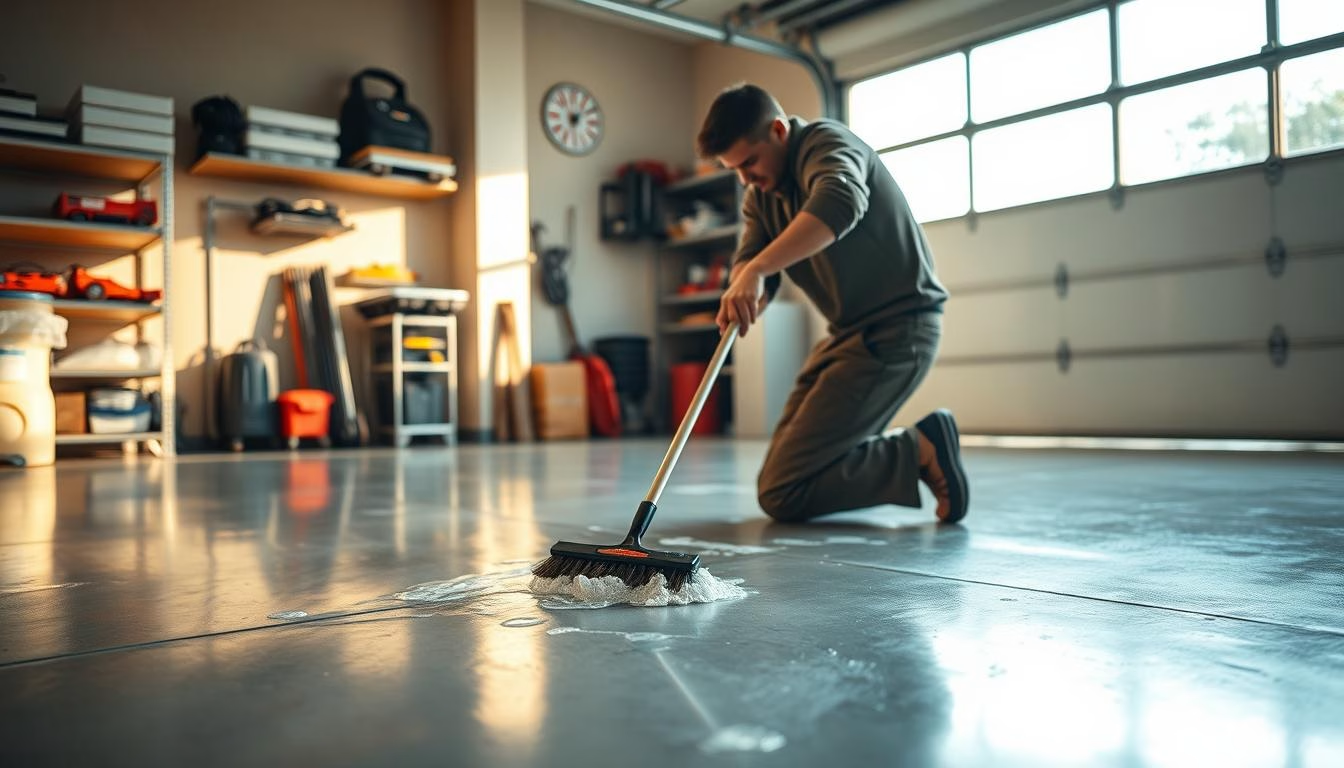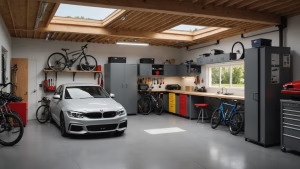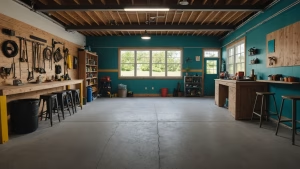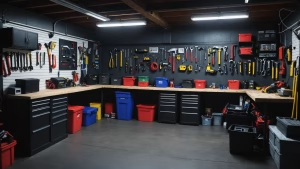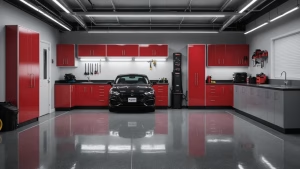A clean garage floor improves safety and maximizes space. This guide explains how to clean garage floor with practical strategies, from daily sweeps to deep-cleaning solutions. Every tip ensures your floor stays durable and organized.
Garage floor cleaning tips in this guide cover tools like brooms, degreasers, and scrub brushes. Learn methods for concrete, epoxy, or tile floors, plus maintenance routines to prevent future messes. Start transforming your garage today.
Why Cleaning Your Garage Floor is Important
A clean garage floor isn’t just about appearances. Regular garage floor maintenance prevents debris buildup that can scratch surfaces or trap moisture. Over time, this damage shortens the floor’s lifespan. Proper cleaning also keeps driveways free of oil and dirt, protecting the surface from cracking. Studies show that unattended grime reduces floor durability by up to 40%.
Slippery spots from spills are a common hazard. Proper garage floor maintenance removes these risks. According to the CDC, over 2 million injuries yearly involve falls in home settings. Regular cleaning using the right methods makes the space safer for vehicles and people. Removing grease or debris improves visibility of hazards like tools or toys left on the floor.
A well-maintained garage adds value to homes. Real estate experts note clean floors increase curb appeal. Buyers often prioritize garages in home inspections. Regular garage floor maintenance boosts resale value by up to 15%, making it a smart investment. Neglecting the space can reduce property appeal and deter potential buyers during showings.
Tools and Supplies You’ll Need
Effective DIY garage floor cleaning starts with the right tools. For cleaning solutions, choose a degreaser like Simple Green or a concrete-safe cleaner such as Black Bear Liquid Gold. Stubborn stains may require trisodium phosphate (TSP), but check local regulations first. A push broom or stiff-bristle scrub brush works best for agitation. For large areas, a pressure washer like Wagner’s Power Xpert X2000 saves time, while a squeegee removes excess liquid efficiently.
Safety comes first. Wear nitrile gloves to protect hands from chemicals and safety goggles to shield eyes. Non-slip shoes prevent accidents on wet surfaces. Old towels or rags double as spill absorbers. Budget-conscious options include vinegar and baking soda as natural alternatives. Pair supplies with the best way to clean garage floor based on your floor type—concrete, epoxy, or sealed surfaces. Always test cleaners on a small area before full application.
Preparing the Garage for Cleaning
Start by clearing every item from the garage floor. Sort objects into three piles: keep, donate, or discard. This step ensures nothing blocks cleaning solutions or damages surfaces during treatment. Garages often hide clutter, so take time to evaluate each item. Use bins or shelves nearby to temporarily store kept items.
Secure large appliances or furniture by moving them against walls. Use dollies for heavy objects to avoid injury. Label boxes clearly for easy reorganization later. Garage floor cleaning tips include checking corners and under stored items for hidden debris. Remove any removable fixtures like shelves to access all floor areas.
Inspect the floor closely for cracks, oil stains, or uneven patches. Document damage locations with photos to track repairs. Note areas needing deep cleaning, like high-traffic spots near doors. This assessment helps choose the right cleaning method in later steps of how to clean garage floor effectively.
Create a safety checklist: wear protective gloves, secure pets and children, and ventilate the space. Place items like bikes or tools in temporary spots outside the garage if needed. Proper prep prevents re-soiling the floor during the cleaning process.
Choosing the Best Cleaning Method
Deciding the best way to clean garage floor depends on your needs. Pressure washing works well for stubborn grime but requires the right equipment. Manual sweeping or mopping suits smaller messes and saves time. Test surfaces first to avoid damage.
Garage floor cleaning tips often recommend scrubbing techniques tailored to stains. Use circular motions for spot cleaning and straight lines for full coverage. Stiff bristle brushes handle oil spills better than soft ones. Avoid metal scrapers on delicate surfaces.
Commercial cleaners cut through grease quickly but may harm plants or pets. Eco-friendly options like vinegar or baking soda are safer but need more elbow grease. Compare cost and availability before choosing.
Time constraints matter too. Pressure washing takes 30 minutes, while manual scrubbing could take an hour. Prioritize safety: wear gloves and ventilate the area when using chemicals. Always rinse thoroughly afterward.
Step-by-Step Guide to Cleaning Concrete Floors
Begin by sweeping the entire clean concrete garage floor thoroughly. Use a stiff-bristle broom to remove dirt, debris, and cobwebs. Focus on corners and under stored items to ensure no particles remain. Proper dust management prevents streaks during the wet phase.
Mix a solution of warm water and mild detergent in a bucket. Apply it evenly using a mop or sprayer. Let it sit for 10-15 minutes to loosen grime. For oil stains, use a degreaser first. Avoid flooding the area to prevent runoff issues.
Rinse the surface with a pressure washer set to low pressure or a mop. Scrub stubborn spots with a stiff brush. Drain excess water immediately to avoid pooling. Use a squeegee to guide water toward drains, ensuring quick drying. Aim for 30 minutes of drying time using fans if needed.
Time each step: sweeping takes 15 minutes, soaking 10-15 minutes, and rinsing 20 minutes. Check drains beforehand to prevent backups. Repeat treatments for persistent stains. Prioritize safety by drying completely before repurposing the space.
Cleaning Other Garage Floor Types
While concrete is common, many garages use alternative flooring materials. Proper garage floor maintenance ensures these surfaces stay functional and attractive. For tile floors, start by sweeping debris and using a grout-specific cleaner like Bona’s Grout & Tile Cleaner. Avoid harsh scrubbing to prevent damaging grout lines. Wipe tiles with a damp mop and dry immediately to avoid water seepage.
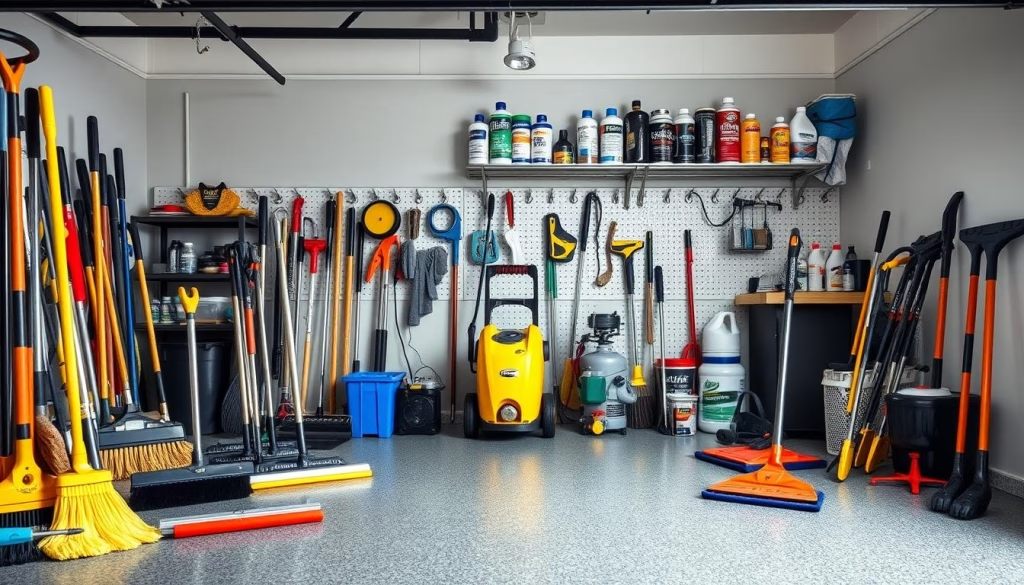
Epoxy-coated floors require gentle care. Clean spills promptly with a pH-neutral cleaner like Method All-Purpose Cleaner. Use a soft sponge and avoid steel wool or abrasive pads. Rinse with water and dry to maintain the glossy finish. For painted concrete, stick to non-acidic cleaners. Mix mild dish soap with warm water and apply with a microfiber cloth. Avoid power washing, as high pressure can strip paint.
Regular DIY garage floor cleaning schedules vary by material. Tile floors need monthly sweeps and quarterly deep cleans. Epoxy surfaces benefit from biannual inspections for wear. Painted concrete should be checked twice yearly for chips. Always spot-test new cleaners in a hidden area first. These steps ensure longevity and safety for all specialty garage flooring options.
Dealing with Stains and Spills
Oil spills and stains can turn even a clean garage floor into a stubborn mess. Removing oil stains from garage floor requires targeted solutions. Common culprits include motor oil, transmission fluid, paint, rust, and tire marks. Each type demands different approaches to ensure effective removal.
For fresh oil spills, absorb excess liquid with rags or kitty litter. Apply Simple Green Garage or Dawn Ultra Dish Liquid to break down residues. Let it sit, scrub with a stiff brush, and rinse. Baking soda mixed with dish soap works for lighter stains. Heavier oil stains may need commercial degreasers like Krud Kutter or TSP (trisodium phosphate). Rust stains respond well to oxalic acid or vinegar-soaked paper towels.
Garage floor cleaning tips include acting quickly—fresh spills are easier to treat. Place drip pans under vehicles and use absorbent mats in high-traffic areas. Seal the floor annually with epoxy or acrylic sealers to resist future stains. Regular sweeping and immediate cleanup of spills prevent buildup, saving time and effort long-term.
Maintaining Your Garage Floor
Regular garage floor maintenance ensures longevity and cleanliness without constant deep cleaning. Start with the best way to clean garage floor as your foundation, then build habits around upkeep. Daily tasks like sweeping debris prevent buildup. Weekly checks for spills or cracks help catch issues early. Monthly, use a mild detergent to scrub high-traffic zones.
Seasonal adjustments matter. In winter, wipe salt residues off shoes before entry to avoid corrosion. Spring is ideal for pressure-washing oil stains. Summer’s dry heat makes it easier to spot treat mildew. Yearly inspections should address drainage to prevent pooling water, which weakens surfaces over time.
Protective measures cut future work. Place rubber mats at entryways to trap dirt. Store chemicals in sealed containers to avoid leaks. Inspect tools weekly—leaky equipment causes stains. Small spills vanish faster when tackled immediately, reducing the need for harsh chemicals later.
Stick to this routine, and your garage floor stays clean with minimal effort. Prioritizing garage floor maintenance today saves time and costs down the line.
Organizing Your Garage After Cleaning
Maximizing garage floor maintenance starts with smart storage. Install wall-mounted shelves or freestanding cabinets from brands like宜家or Overstock to keep tools and supplies off the floor. Open shelving and stackable bins save space while making items easy to find. A clutter-free layout supports DIY garage floor cleaning efforts by reducing tripping hazards and preventing spills.
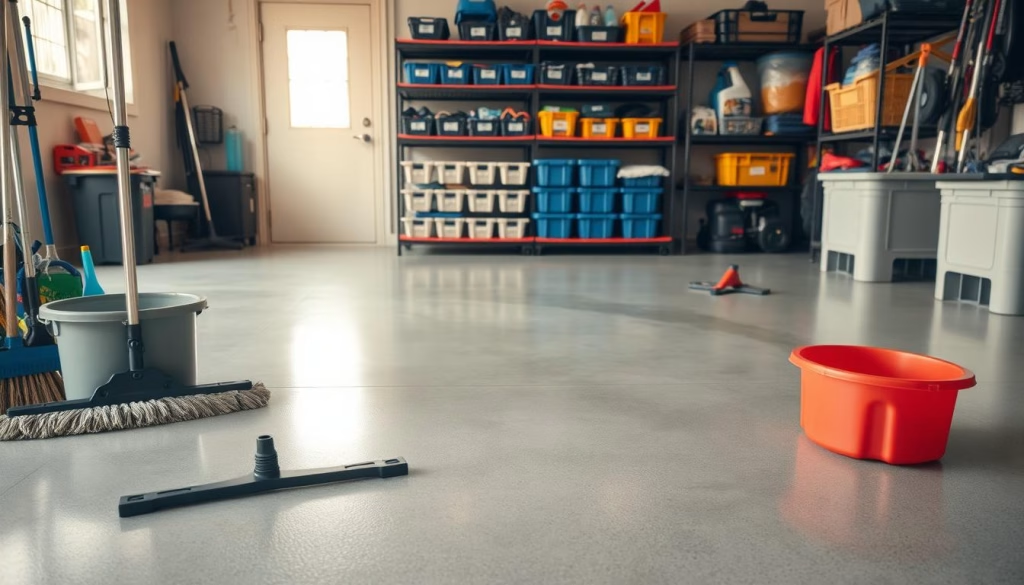
Vertical space is key. Use overhead storage systems like those from The Container Store to hoist rarely used items above head height. Overhead racks keep vehicles clear of floor space, maintaining accessibility after cleaning. Adjustable brackets ensure heavy items like seasonal decor or sports equipment stay safely stored without weighing down floor surfaces.
Labeling systems boost long-term maintenance. Use chalkboard labels or adhesive tags to categorize storage zones. Clear bins from Rubbermaid with see-through lids let you identify contents without rummaging. Hooks from 3M Command brand mounted on walls keep frequently used items like rakes or hoses within reach without littering the floor.
Regular organization habits extend the results of DIY garage floor cleaning. Monthly checks of stored items prevent debris buildup and ensure pathways stay clear. A well-organized space naturally supports garage floor maintenance by minimizing dirt accumulation and simplifying future cleaning tasks.
When to Call Professionals
Knowing when to hire experts ensures your garage floor stays in top condition. Severe stains, like oil or chemical spills, often resist standard cleaning methods. Deep cracks, flaking concrete, or water damage signal potential structural issues best addressed by professionals. Homeowners struggling with persistent grime after multiple DIY attempts should also consider professional help.
Professional cleaners use specialized tools like high-pressure washers and industrial-grade chemicals. They handle hazardous materials safely, ensuring surfaces are restored without risking personal injury or further damage. For instance, garage floors with flaking concrete might need repairs before cleaning, a task requiring skilled labor.
Costs vary based on square footage and needed repairs. Expect rates from $0.10 to $1.50 per square foot, depending on location and service complexity. Always request written quotes detailing included services and guarantees. Ask about experience with similar projects and check references to ensure reliability.
While DIY methods work for routine maintenance, major repairs or hazardous situations demand expert intervention. Professional services provide long-term solutions and safety assurances, making them a smart choice for challenging cases.
Eco-Friendly Cleaning Options
Going green doesn’t mean sacrificing results. For those aiming to remove oil stains from garage floor without harsh chemicals, eco-friendly options exist. Start by choosing biodegradable cleaners like Seventh Generation or EcoLogo-certified products. These break down oils safely while meeting environmental standards. Always check labels for certifications ensuring minimal ecological impact.
Natural ingredients work wonders. Mix baking soda with vinegar to form a paste, scrubbing greasy areas before rinsing. Citrus-based solutions, like those from Better Life or Mrs. Meyer’s, dissolve grime using plant extracts. Let these sit on stains overnight for maximum effectiveness. For heavy oil spots, sprinkle kitty litter first to absorb excess, then apply cleaners.
Save water while maintaining cleanliness. Use microfiber mops instead of pressure washing, reducing water use by up to 70%. Collect rinse water in buckets—reuse it for future cleaning or dispose of it properly through municipal guidelines. Eco-solutions paired with smart practices make the best way to clean garage floor both planet-friendly and practical.
While eco-methods excel for light messes, stubborn stains may still need professional eco-certified services. Prioritize brands with transparent ingredient lists and recyclable packaging. Small adjustments today create long-term benefits for your garage and the environment.
Final Thoughts on Garage Floor Care
Maintaining a clean garage floor isn’t just a one-time task—it’s about consistent garage floor maintenance. By setting a monthly cleaning schedule, families can share responsibilities, keeping the space tidy without strain. Simple steps like sweeping weekly and wiping spills immediately turn garage floor cleaning tips into easy habits.
Regular care extends floor lifespan and boosts home value. A well-maintained garage avoids costly repairs and resale issues. Resources like “The Organized Garage” by Julie Edlund or guides from brands like Bona or Simple Green offer detailed garage floor cleaning tips. Check forums like r/HomeImprovement on Reddit for real-life solutions, or visit manufacturer sites like 3M for product insights.
Viewing garage upkeep as part of home care, not a chore, shifts the mindset. Small efforts today save time and money long-term. Prioritizing garage floor maintenance ensures a functional space that enhances daily life. With the right tools and routines, maintaining a clean garage becomes manageable and rewarding.

